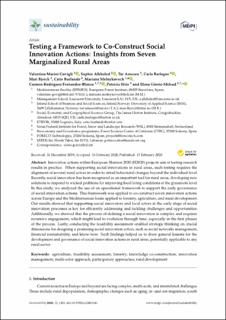| dc.description.abstract | Innovation actions within European Horizon 2020 (H2020) projects aim at testing research results in practice. When supporting social innovations in rural areas, such testing requires the alignment of several rural actors in order to entail behavioral changes beyond the individual level. Recently, social innovation has been recognized as an important tool for rural areas, developing new solutions to respond to wicked problems for improving local living conditions at the grassroots level. In this study, we analyzed the use of an operational framework to support the early governance of social innovation actions. This framework was applied to co-construct seven innovation actions across Europe and the Mediterranean basin applied to forestry, agriculture, and rural development. Our results showed that supporting social innovators and local actors at the early stage of social innovation processes is key for efficiently addressing and tackling challenges and opportunities. Additionally, we showed that the process of defining a social innovation is complex and requires recursive engagement, which might lead to evolution through time, especially in the first phases of the process. Lastly, conducting the feasibility assessment enabled strategic thinking on crucial dimensions for designing a promising social innovation action, such as social networks management, financial sustainability, and know-how. Such findings helped us to draw general lessons for the development and governance of social innovation actions in rural areas, potentially applicable to any rural sector. | en_US |

